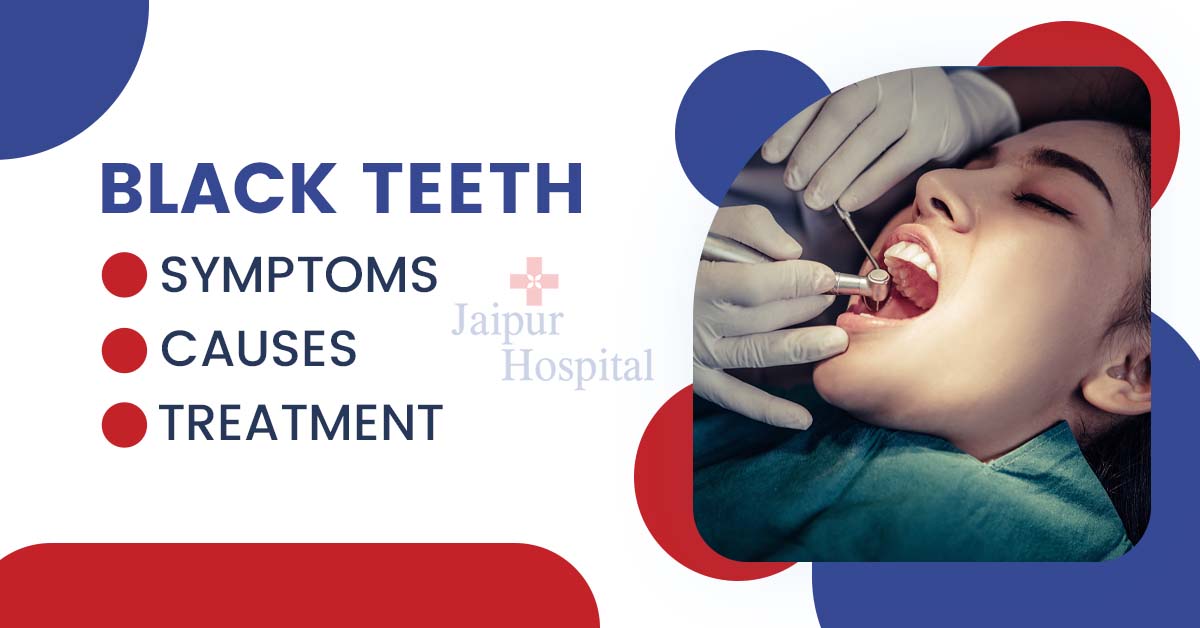While it’s unknown how many of us have discolored teeth, it’s obvious that we care about how bright and healthy our teeth are. These days, having a bright smile is seen as somewhat of a social status signal, which has made whitening goods and procedures very common.
The American Academy of Cosmetic Dentistry reports that the majority of people (99%) believe that our smiles are our most valuable social assets. Black teeth may be a sign of a hidden dental condition that should not be disregarded.
Normal tooth colors include white, whitish-yellow, and whitish-gray. Because there is so much calcium in the enamel, teeth have a white color. The tough exterior of the teeth is called enamel.
Calcium is a whitish substance by nature. Calcium is mostly responsible for the coloring of teeth. The teeth can, however, contain mixtures of various elements that might impart grey and yellow tones.
Over time, your enamel begins to deteriorate, allowing the dentin, the layer beneath, to become visible. The teeth may appear darker as a result. External stains might also appear on tooth enamel.
Causes of Black Teeth:
There are various causes of having black teeth, some of the causes are listed below:
- Improper hygiene. Brushing your teeth insufficiently thoroughly or consistently failing to do so can cause plaque to build up and eventually take on a deeper hue, which will also impair how white your teeth are.
- Smoking causes teeth to turn black in addition to causing them to yellow. The tar in the tobacco is to blame for this. It gives the teeth a dark color by settling on them. In this situation, toothpaste will have little to no impact and occasionally won’t even be helpful; only professional teeth cleaning, such as processing with soda under pressure, will be helpful.
- Products with dyes. If you regularly consume tea, coffee, red wine, and juices, as well as different berries and dark chocolate, their coloring microparticles may become embedded in your tooth’s enamel, and over time, you might notice that your teeth have darkened. It is entirely unnecessary to stop using these products; all that is required is that you refrain from abusing them and brush your teeth after each use. Abrasive toothpaste should be used 1-2 times per week as a preventative measure.
- Tooth decay and eating sweets. If you consume sweets frequently, you will eventually develop caries, which will cause the enamel on your teeth to become demineralized and cause black spots to appear.
- Tooth trauma. It will not be surprising if you get black teeth if you have ever experienced trauma to the maxillofacial region. It’s possible that the neurovascular bundle injury that caused this phenomenon allowed hemoglobin to enter the tooth, which caused the tooth to turn black from the inside out. You must visit a dentist very away to get your teeth treated since the tissues will begin to break down and cause an even darker hue to develop.
- Poor drinking water. Despite how strange it may sound, fluoride-rich water can cause illnesses like fluorosis, which damages the teeth’s enamel. They consequently change color to brown before taking on a black tint. Unfortunately, teeth whitening is ineffective in this situation; your only option is orthopedic treatment, which involves crowning the teeth.
- Metal fillings. Your teeth may eventually become darker if you have copper amalgam fillings. These fillings are strong enough, which is why Israel and the USA particularly adore them, but if aesthetics are important to you, it is better to replace them with ones that are more biocompatible and made of a different material.
- Сhemotherapy. These impacts have significant consequences on the body, which can have negative implications on the teeth’s health.
- As we age, the enamel coating on our teeth gets progressively thinner, which also causes teeth to darken.
If we’re talking about dead teeth, then a lack of metabolism, poor fluid flow inside the tooth, and canal clogging are the causes of darkening.
Since there isn’t a nerve to supply the tooth with the necessary microelements, it darkens much more quickly and eventually can take on a black or gray tint. A crown is the only way to prevent all of this because the pigments that stain the tooth are not washed out of it.
Read Also: Personal Hygiene Tips for Hair, Skin and Body Parts
Symptoms of Black Teeth:
A tooth rarely abruptly transforms from a whitish color to black. Before the tooth begins to turn black, a person will typically notice a few other symptoms.
Before teeth discoloring, a person’s teeth may become more sensitive, causing discomfort when they eat or drink. Additionally, tiny, black dots that appear on the teeth may appear, usually close to the gum line. Children with black teeth frequently experience this.
When tartar is the culprit, a person will likely notice black discoloration on the front teeth’s interior or exterior. If a dentist doesn’t remove the tartar, the stain will continue to accumulate. As the enamel deteriorates in these situations, holes may form.
Prevention of Black Teeth:
The appearance of black teeth is not thought to be appealing, and in many instances, they can also be accompanied by severe pain. Preventing black teeth from developing in the first place is the sensible course of action because as they deteriorate they can lead to additional problems below the gum line and other issues.
The following advice can help reduce the likelihood of black teeth recurring after you have had treatment for them:
- Improve oral hygiene: What else will motivate you to practice better oral hygiene if having dark-colored teeth? It will help if you take oral hygiene seriously and brush and floss properly. Kids can learn about this, and parents should make sure their kids have good oral hygiene.
- Take good care of your gums: People often concentrate on dental issues, but gums can also be a major contributor to many dental problems. To prevent bleeding gums, make sure to gently brush your gums as part of your routine and to floss between your teeth frequently.
- Try mouthwash or chewing gum: Mouthwash and whitening chewing gums can help whiten stained, tartar- and plaque-coated, or otherwise temporarily discolored teeth. You can also make every effort to stay away from specific foods that tend to discolor your teeth.
The better care you give to your teeth, the less likely it is that you will experience black teeth or any other dental problems, along with the problems that come with them. Attending routine checkups and cleanings is the most crucial action you can take to avoid developing black teeth because it will keep your mouth healthy at all times.
Treatment of Black Teeth:
Black teeth are typically impossible to remove at home. While mild discoloration may be helped by at-home whitening kits, black teeth usually need professional care. The teeth will be examined by a dentist to identify the underlying issue and choose the best course of action.
What if tartar is the cause?
When tartar is the problem, a dentist will need to scrape the tartar off the teeth to remove the buildup. The tartar may need to be broken up and made easier to remove using ultrasonic instruments, which vibrate.
What if decay is the cause?
It is unlikely that a dentist will be able to whiten dark teeth in cases of decay by simply cleaning them. Instead, the tooth’s decaying area will need to be removed.


